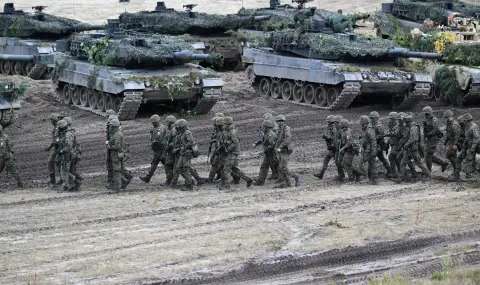Yesterday's meeting of European leaders, dedicated to Ukraine, is a leading topic in the Western press.
European leaders expressed their support for Ukraine at the meeting in Paris and agreed that now is "not the time" to lift sanctions against Russia. However, disagreements over Franco-British plans to provide guarantees to Ukraine in the event of a possible ceasefire remain, writes the British newspaper "The Guardian".
The British publication draws attention to the words of French President Emmanuel Macron that a consensus was reached at the meeting that sanctions against Moscow should not be weakened until "peace is clearly established" in Ukraine.
The third meeting of what France and the United Kingdom call a "coalition of the willing" on Ukraine was called amid growing concerns that US President Donald Trump may be considering easing some sanctions on Russia in order to get Moscow to agree to a partial ceasefire deal.
W. The "New York Times" focuses on Emmanuel Macron's words that a "coalition of the willing" will continue to support Ukraine in the war against Russia and that it will contribute to preserving a possible peace - including by deploying troops on Ukrainian territory after the end of the conflict.
However, Macron also said that the details of the idea of deploying troops are still being specified and that there are not many details about who among those who want to do what exactly is ready to do.
The idea of deploying troops in Ukraine is a cause for division among European countries, writes the "Daily Telegraph".
The British daily notes that Italy and Poland are against sending their soldiers to Ukraine, and Macron has said that unanimity is not necessary in making this decision.
"Daily Telegraph" also focuses on Macron's words that Russian President Vladimir Putin is only "pretending" to want peace.
The British publication also draws attention to the words of Ukrainian President Volodymyr Zelensky that Putin is not ready for direct negotiations with Ukraine.
Another interesting moment from today's press is the focus on Zelensky's words that Putin will die soon.
V. "The Times" focuses on Zelensky's statement to Eurovision News that Putin is nearing the end of his life and that once he dies, the invasion of Ukraine will be put to an end.
"He will die soon - that's a fact, and everything will end. I'm younger than him, so bet on me. I have better chances than him," emphasized the 47-year-old Zelensky.
"The Times" notes that Zelensky has not explained why he believes the 72-year-old Putin will die soon. The British publication writes that there have been rumors for years that Putin suffers from Parkinson's disease or that he is sick with cancer, but that these rumors have not been confirmed.
